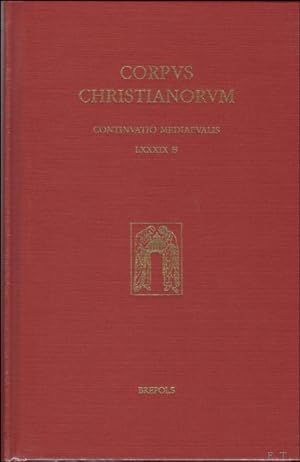R HOFMAN ED ; (3 risultati)
Tipo di articolo
- Tutti gli articoli
- Libri (3)
- Riviste e Giornali
- Fumetti
- Spartiti
- Arte, Stampe e Poster
- Fotografie
- Mappe
-
Manoscritti e
Collezionismo cartaceo
Condizioni
- Tutte
- Nuovi
- Antichi o usati
Legatura
- Tutte
- Rilegato
- Brossura
Ulteriori caratteristiche
- Prima edizione (2)
- Copia autografata
- Sovraccoperta
- Con foto (1)
- No print on demand
Paese del venditore
Valutazione venditore
-
Journal of the Franklin Institute. January-March, 1916. Vol. 181. No. 1-3.
Editore: Franklin Institute, 1916
Da: Books From California, Simi Valley, CA, U.S.A.
Hardcover. Condizione: Good. 3-issues bound together. Ex-library copy with usual markings in a library binding. Cover shows moderate wear, tear, and rubbing. Pages are tanned with minor chipping and staining.
-
Corpus Christianorum. Gerardus Magnus, Ioannes Rusbrochius Opera omnia V, 1 Ioannes Rusbrochus,i Ornatus spiritualis desponsationis Gerardo Magno interprete;
Editore: Turnhout Brepols 2000, 2000
Da: BOOKSELLER - ERIK TONEN BOOKS, Antwerpen, Belgio
Membro dell'associazione: ILAB
Prima edizione
Hardback, XCVII+230 p., 155 x 245 mm. ISBN 9782503047218. This volume comprises an editio princeps of the Latin translation of Die geestelike brulocht, arguably the best and most detailed description of mysticism from the fourteenth century, written in the 1340s by the Brabantine mystic, Jan van Ruusbroec, in Middle Dutch (available in CC CM, vol. 103, ed. by J. Alaerts). The Latin translation was made in or around 1384 by Geert Grote (1340-1384), founder of the religious reform movement known as the Devotio moderna. This Latin version contributed substantially to the further spread of Ruusbroec's ideas among those whose command of Middle Dutch was inadequate or lacking. Grote's concern to translate as literally as possible resulted in a Latin text which offered spiritual guidance in exactly the manner intended by the author of the original work. The edition, prepared by a leading scholar of medieval Latin, is based on all 13 extant manuscript witnesses and is a major contribution not only to the field of medieval Latin, but also to research into the history of spirituality, bilingualism in the Middle Ages, and the sources of, and influences within, the Devotio moderna movement. A notable feature of the introduction is the lucid discussion of problems connected with editing a medieval translation. Particular attention has been drawn to the fact that several scribes, whose job it was to copy a Latin translation, each had recourse to the vernacular source-text. Rijcklof Hofman is a research scholar at the Titus Brandsma Instituut for the scientific study of spirituality in Nijmegen (Netherlands) and at the Department of Comparative Indo-European Linguistics at the University of Leiden. Earlier publications include his widely-acclaimed 750-page edition of 'The Sankt Gall Priscian Commentary', a ninth-century bilingual (Latin-Old Irish) commentary in gloss form on Priscianus's 'Institutiones Grammaticae'. Languages: Latin. 0 g.
-
Corpus Christianorum. Gerardus Magnus Opera omnia II, 1 Sermo ad clerum Traiectensem de focaristis - Opera minora contra focaristas,
Editore: Turnhout Brepols 2011, 2011
Da: BOOKSELLER - ERIK TONEN BOOKS, Antwerpen, Belgio
Membro dell'associazione: ILAB
Prima edizione
Hardback, 653 p., 4 b/w ill., 155 x 245 mm. ISBN 9782503533469. During a diocesan synod held in 1383, the Dutch Church reformer Geert Grote (1340-1384) delivered a sermon in which he vigorously attacked priests living together with concubines in the Diocese of Utrecht, whom he called focarists. After he had delivered his sermon, Grote worked it out into a written treatise comprising 26 dicta or chapters in more than 3500 lines. Grote advocated a rigorous viewpoint. Thus, he pointed out in dictum 2 that anyone who attends the offices of a notorious focarist, commits a mortal sin. His strict position met with considerable opposition. This led to various minor works either summarizing the long sermon or elucidating particular points. In the end, Grote?s opponents succeeded in their efforts to bring about his downfall. In the present volume the major documents in the focarists? dossier are edited scientifically for the first time, replacing the earlier 1830?s edition. The volume also presents an editio princeps of a Middle Dutch partial translation as well as of a recently discovered fragment elaborating on the contents of dictum 2. In unfolding his diatribe, Grote relies on a great number of authorities and predecessors. A detailed analysis of this wealth of material has resulted in a highly innovative assessment of Grote?s use of sources, included among the introductory matter. Languages: Latin. 0 g.



